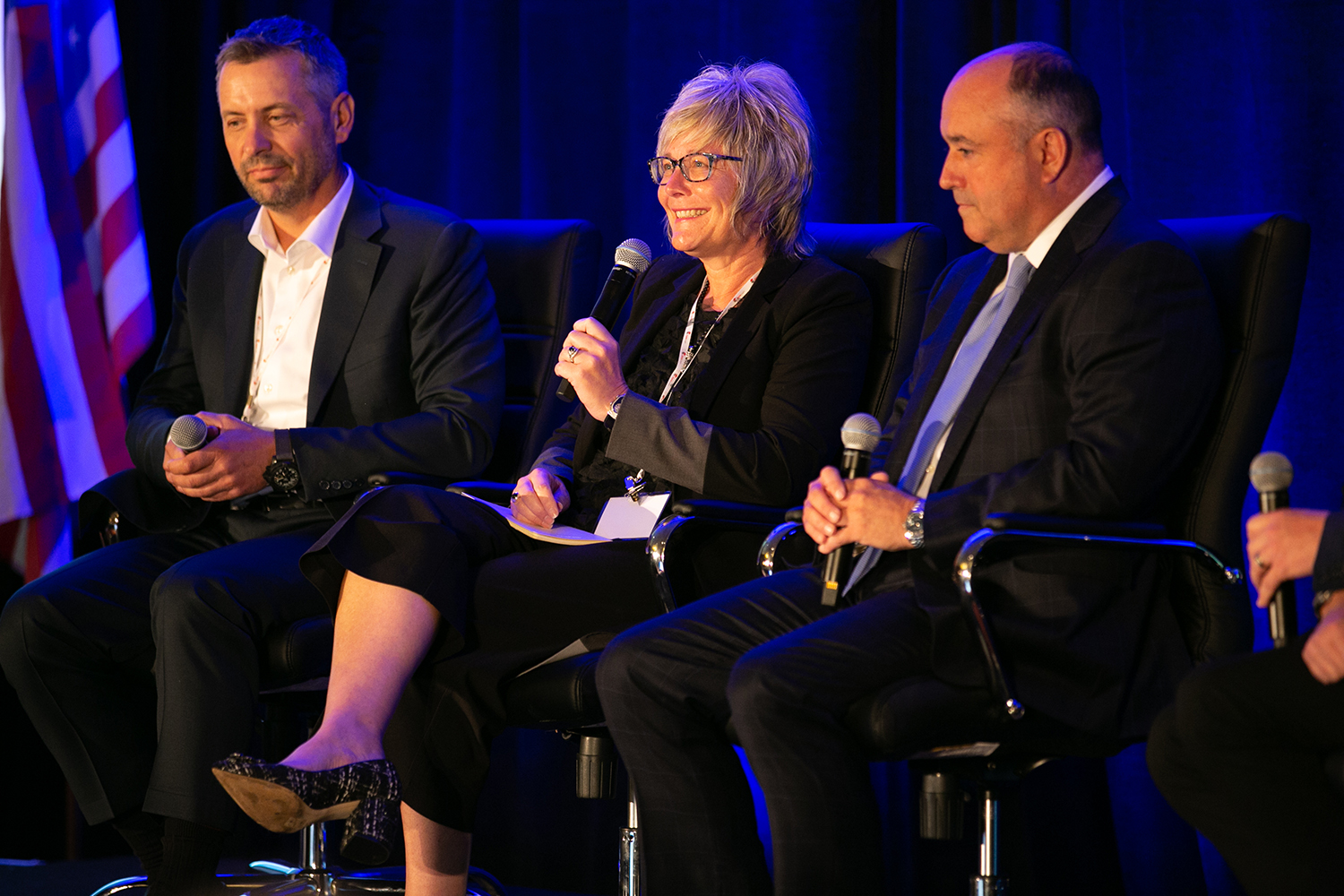(Above, L to R) Sarah Young, National Association of REALTORS®; Dave Zitting, Avenu, Inc.; Brooke Anderson-Tompkins, 1st Priority Mortgage, Inc.; Larry Flick V, Berkshire Hathaway HomeServices Fox & Roach, REALTORS®; and Walt Mullen, Title Resource Group (TRG), discuss “Affiliated Services in Today’s Environment: How to Maximize Revenue and Ensure Compliance” at RISMedia’s 2019 Real Estate CEO Exchange. (Credit: Korin Krossber of PlanOmatic)
For brokerage businesses operating in the regulatory scene today—post-Dodd Frank, but with change on the horizon—knowledge is power, and communicating it is key.
“It takes a village,” said Brooke Anderson-Tompkins, president of 1st Priority Mortgage, Inc., during RISMedia’s 2019 Real Estate CEO Exchange, held in New York City September 18-19.
“Many agents are familiar with the alphabet soup of RESPA—but many are far less familiar with the recognition of the choices that they are faced with, and the implication that they can be charged $10,000 and upwards per occurrence,” Anderson-Tompkins said. “Making agents more familiar with the ramifications of some of the choices put before them, they may make different choices.”
Anderson-Tompkins joined Larry Flick V, CEO, Berkshire Hathaway HomeServices Fox & Roach, REALTORS®; Walt Mullen, senior vice president and chief strategy officer, Title Resource Group (TRG); and Dave Zitting, co-founder and co-CEO, Avenu, Inc., at the exclusive event, which gathered more than 300, for the panel session “Affiliated Services in Today’s Environment: How to Maximize Revenue and Ensure Compliance.” Moderated by Sarah Young, director, Real Estate Services/Advocacy at the National Association of REALTORS®, the discussion highlighted minimizing risk and, at the same time, creatively developing new revenue streams, as appetites grow for on-demand, “one-stop,” seamless transactions.
“You can set up electronic rooms where you can house all of the documents that are related to the real estate transaction, and if the consumer is using all of your in-house financial services, all the documents for the transaction will be in that room,” Flick said. “The consumer can go in that room at any time before, during or after the transaction to obtain or look at all of the documents and get a status on their transaction and see where things are.”
“One-stop shopping…the consumer is more conditioned to do that than they ever were before,” Mullen said. “The simplicity of working across the food chain is important.”
To help improve and streamline transactions, TRG leverages Net Promoter Scores (NPS), which are based on a consumer’s likelihood of recommending a service.

(L to R) Dave Zitting, Avenu, Inc.; Brooke Anderson-Tompkins, 1st Priority Mortgage, Inc.; and Larry Flick V, Berkshire Hathaway HomeServices Fox & Roach, REALTORS®, at the CEO Exchange (Credit: Korin Krossber of PlanOmatic)
“We share with agents how we’re doing for their clients,” Mullen said. “They own their consumer relationships, and what their consumers are saying about what we’re doing for them—and sharing those stories across the branches with their cohorts—is very important.”
In a similar vein, Zitting pointed to “transactional convergence,” or Avenu’s concept of a “converged” experience, in which agents and brokerages manage the moving parts of a transaction—and all of the interactions within one—to merge revenue.
“We created a technology solution and finance platform that manages , but it’s built on choice, because our industry works in a way that is relationship-driven,” said Zitting. “Agents want to work with the lenders they want to work with. It’s bringing those relationships into the fold.”
Amid the desire to meet preferences, compliance is necessary, the panelists stressed—and so is collaboration, especially for modernizing outdated regulation.
“We’re seeing a lot of different technologies and concepts coming into the industry, but they’re being put up against laws created in the ’70s and ’80s,” said Zitting, addressing the Consumer Financial Protection Bureau’s No-Action Letter (NAL) and Compliance Assistance Sandbox (CAS) policies, which allow for innovation by permitting product testing, despite regulatory uncertainty.
“As the laws were written, nobody could have imagined the sort of data that is available to businesses today, or the internet, or the ways in which technology platforms allow us to work,” said Zitting. “With the CAS, what that basically is is saying ‘We don’t see any major issues with this, but we do have antiquated laws, so we’re going to put you into this CAS, or sandbox, and this is a safe harbor. Let’s see how the technology goes, and how it interacts with businesses and the consumer.'”
Collaboration is key locally, as well. TRG, along with a brokerage partner in Utah, “got a law changed that was in place for over 20 years that was so restrictive that brokerages could not be in the title business,” Mullen shared.
“We are a community…If you see an opportunity, raise your hand,” he urged.
Anderson-Tompkins discussed the Qualified Mortgage (QM) patch, which could expire, having an impact on minority mortgages and other ramifications. Whatever the outcome, she emphasized the importance of speaking up.
” Kathy Kraninger has said they have every intention of letting the QM patch expire,” she explained. “That might be a challenge. The sky’s not falling; we have time and we have great opportunities with the advocacy of NAR…I just ask that you be aware and share your voice, because it’ll matter.”
On the affiliate side, Flick noted, Dodd-Frank has eaten into revenue. He cited loan originator (LO) payments, which are now the same universally.
“A byproduct of was the change in how LOs are paid,” Flick explained. “On the surface, it seems like a good rule, because what was happening was LOs were getting paid more on different products and steering the consumer. The issue is that when a loan officer takes a loan and locks it incorrectly, there’s a pricing penalty to the mortgage company. What used to happen is the mortgage consultant would share part of that penalty, but now, the company takes on the full amount of that penalty. That part of the rule cost our company a lot of money. That regulation has hurt the mortgage industry.”
By advocating for changes to dated legislation or needed reforms, brokers can help reduce risks—but, challenges remain, especially surrounding wire fraud. As with compliance training, education is vital. Recently, TRG designed FraudRacer, an educational game.
“People can play a game and learn about the ways that as a consumer, as well as an agent, their information could be stolen,” Mullen said. “The data environment that we live in and the standards that we have, we can do the best we can possibly do, it just takes one mistake…everyone has to keep their guard up all the time. It’s our No. 1 risk as an industry.”
When incidents occur—and they do—an action plan is necessary, Flick said.
“We have a direct line to our local FBI office and we have a process in place,” he said. “Even if the money gets stolen, it’s often sitting in an account for a couple of days and they can chase it and get it back. I encourage you to go down that path.”
For CEO Exchange continuing coverage, visit RISMedia.com.
 Suzanne De Vita is RISMedia’s online news editor. Email her your real estate news ideas at sdevita@rismedia.com.
Suzanne De Vita is RISMedia’s online news editor. Email her your real estate news ideas at sdevita@rismedia.com.











